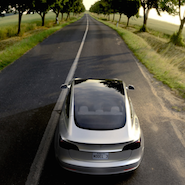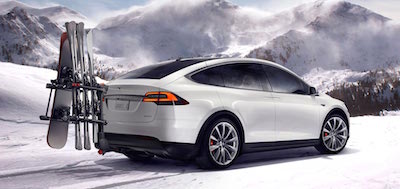Norway has announced that it plans to ban petroleum-fueled automobiles within a decade.
Several sources have now reported that politicians have reached a bipartisan agreement to ensure that all cars sold in Norway will run entirely on green energy by 2025. Norway’s small population and history of ecological progressivism make its ambition more feasible, but the development nonetheless points to trends in both the automotive and political spheres.
“Most manufacturers that sell [electric] vehicles in the U.S. are doing so because they have to in order to sell their product in California,” said Lauren Fix, automotive expert, Lancaster, NY.
“California has a law that states if you sell more than 2,500 vehicles in the state, you must offer a battery powered vehicle,” she said. “Otherwise, manufactures most likely would not carry an electric powered vehicle because they take a loss on every single vehicle.”
Going green
The announcement comes on the heels of Norway’s commitment to cease all deforestation efforts and has been corroborated by the Democratic and Liberal Party. Elon Musk, CEO of the all-electric Tesla Motors, tweeted his support of the announcement shortly after hearing the news.
Just heard that Norway will ban new sales of fuel cars in 2025. What an amazingly awesome country. You guys rock!! pic.twitter.com/uAXuBkDYuR
— Elon Musk (@elonmusk) June 3, 2016
Norway has a history of being on the frontlines of the battle against global warming, often serving as a model for larger countries. The plan to ban petrol vehicles, however, is a particularly ambitious step given that oil reserves are a large part of the country’s economy.
However, that petroleum money has been used to subsidize its green lifestyle, including enormous subsidies and incentives to purchase electric vehicles. Electric vehicles are exempt from taxes associated with purchasing vehicles, which often double the sticker price of cars.
Additionally, drivers of electric vehicles can look forward to free charging at municipal stations, free parking and other such benefits. Tesla has therefore been a particularly big beneficiary of Norway’s ecological consideration, with the Model S becoming the best seller in 2014.
Norway’s plan is more ambitious than the United Kingdom’s, which pledged to remove diesel and petrol vehicles from the road by 2030. The government has recently been under criticism for taking insufficient steps to achieve that goal.
While Norway’s plan is ambitious, it is difficult to ascertain the impact this will have the automotive industry as a whole. Luxury brands are currently the leaders in electric vehicle offerings (see story), and many brands are expanding their green fleet or preparing to enter the market.
While Norway’s goal is ambitious and unlikely to spur immediate action on the part of less progressive countries, it is part of a worldwide trend toward sustainability, and automobiles remain one of the most visible targets for countries hoping to reduce their carbon footprint. While brands may be able to accommodate Norway’s policy by 2025 or devise a strategy in other markets to make up for lost grounds, it is clear that they must stay focused on providing and upgrading emissions-free products.
Indeed, California’s current regulations have played a part in bringing electric vehicles to the market, but sales of those models still are not profitable. As pressure mounts to go green, brands are also faced with internal pressure to generate revenue, and questions arise about the feasibility of these ambitious goals.
“Most people cannot afford a $100,000 vehicle,” Ms. Fix said. “That’s why the average age of cars on the road here in the U.S. is about 11 1/2 years old. In Europe, that is true as well.
“To eliminate gasoline or fossil fuel powered vehicles from the roads in a specific country will not just impact the economy in a negative way, it will also impact the auto industry in a negative way,” she said. “In addition, their power grid cannot support every vehicle on a charging station or on their electric grid. It’s a very shortsighted decision.”
Electric era
British automaker Aston Martin is among those turning its attention toward electric vehicles.
The brand recently chose a partner to bring its RapidE electric vehicle concept to production.
In February, Aston Martin signed a Memorandum of Understanding with technology company LeEco, a first step in developing a collaboration that create a production model of the brand’s concept car. As consumers become more environmentally conscious, automakers have found they need to develop cars that leave less of a footprint (see story).
While the RapidE was designed with China in mind, it signals the beginning of the brand’s incorporation of more sustainable powertrains into its fleet, an initiative that will develop in the coming years.
However, the rush to get electric vehicles to the market to appease high demand has led to legal problems.
German automaker BMW is fighting allegations of defects in its electric i3 vehicles.
On May 17, MLG Automotive Law filed a national class action lawsuit against BMW North America, LLC alleging that the i3’s “Range Extender” feature is defective. Automakers are clamoring to garner a sizable share of the growing electric vehicle market, so the setbacks of the lawsuit could be substantial if these allegations are verified (see story).
from
http://redirect.viglink.com?u=http%3A%2F%2Fredirect.viglink.com%2F%3Fu%3Dhttps%253A%252F%252Fwww.luxurydaily.com%252Fnorway-to-ban-petrol-vehicles-by-2025-signaling-impending-ev-dominance%252F%26key%3Dddaed8f51db7bb1330a6f6de768a69b8&key=ddaed8f51db7bb1330a6f6de768a69b8



No comments:
Post a Comment